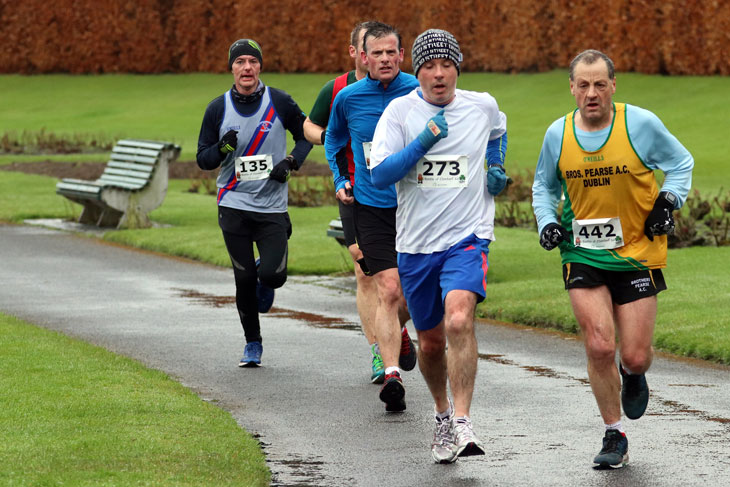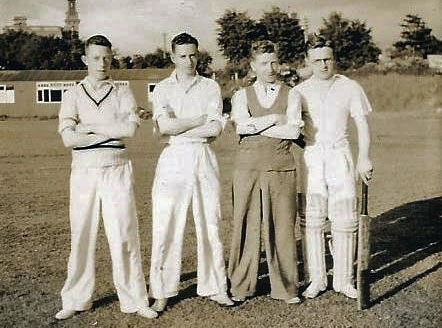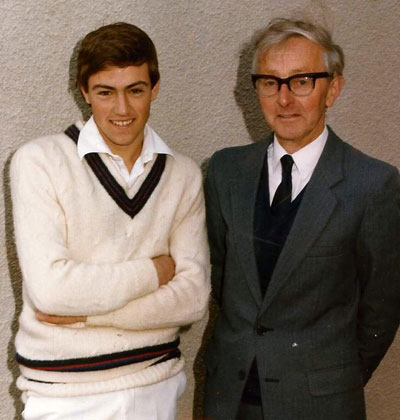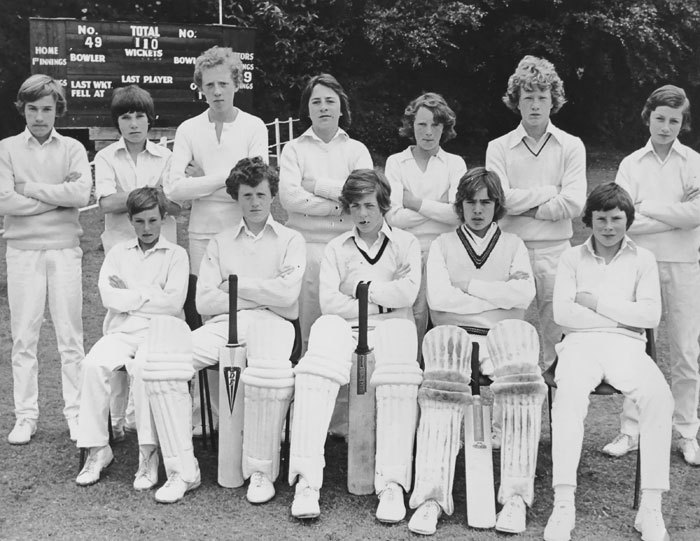We all have differing experiences of growing up in sport. My contemporary Peter Prendergast has written, with great humour and poignancy, about growing up in Clontarf CC, his experiences together with his older brother, Canice is set within the confines of the grounds and more specifically in the nets. My experiences were slightly different though, at least in my early years. Peter lived 200 yards from the club and would be in the nets from his door in a couple of minutes after hopping through the hole in the hedging on Castle Avenue, cutting his travel time in half. I lived a bit further away, 2 miles up the road in Raheny and I was never a fan of the bicycle, so my earliest memories of cricket are firmly fixed in my back garden.
It was a huge advantage then that I had a father who loved sport and an elder brother who was similarly obsessed as his younger sibling. Peter, my brother, was close enough in age, being just 2 years older so it was a perfect match. We played football (I was Pat Jennings while he was Martin Peters), rugby and of course cricket. We played rugby with an old leather ball so misshapen that when at the end of our passing and tackling lessons with Dad, we were able to play soccer quite easily with it, as well. That might, of course, explain the lack of soccer skills. Indeed what we played depended on the time of year, during Wimbledon, out came the rackets and while the Carroll's Irish Open was on, we would queue for hours to hack our way around the par 3 in St Annes Park and every 4 years we hosted our own Olympics. We even took to the boxing ring (home made of course), a pretty poor decision on my part. Running in the dunes of Dollymount or around the park, we led an active (hyperactive?) life.
 Peter Vincent (right) racing in St Annes Park
Peter Vincent (right) racing in St Annes Park
While youth sport was not organised to the extent that it is now, looking back, we still got our share. Football with the Cub Scouts or the Summer Roads League, athletics in the Community Games which itself had a build up, Ennafort Games (our estate) lead on to the Raheny Games, then the regionals in Santry Stadium before the Holy Grail of Mosney and the Nationals. While today's youth have a diary full of sport, we still got our share, albeit in a more haphazard way. And we played every sport possible and wouldn't have had it any other way. Play as much as you can for as long as you can.
Having a brother who was a constant sporting sidekick was a big plus, even more so was having parents who actively encouraged participation. My Dad had grown up in Kimmage, to parents who were not sporty. It is said that his maternal grandfather Daniel Hill had played football for Glentoran before he came to Dublin in search of work, at the turn of the 20th century, but the records suggest that if he did, then it wasn't for the first team. Instead my father found his sport via the Boys Brigade, in his era the BB provided a huge sporting outlet for their members particularly in football, rugby and cricket and they even had their own dedicated sports fields.
And my Dad lapped it up. Later he would join the 3rd OBU cricket club, the club founded for the Old Boys of the 3rd BB Company who were a decent club operating out of Churchill Terrace. He was a second team player, a wicket keeper, "Buckets" he used to tell us while showing us his hands. While he undoubtedly loved the competition, he understood that he was playing for fun. I could never understand the delight he took in boasting that his team had been bowled out for 1 in a game against Dean Hill. He retired from cricket when family came along though I do have a clear recollection of going out to Malahide CC to see him play what must have been a Business Houses game for Wiggins Teape, whose Managing Director was Joe McCleery, a stalwart of that club and later the man responsible for providing much needed sponsorship of Leinster cricket. Indeed, there would have been a good chat at the tea breaks in WT on a Monday morning with Arthur Vincent also an employee.
 Dad (right) at 3rd OBU ground, Churchill Terrace
Dad (right) at 3rd OBU ground, Churchill Terrace
For Dad though, the game had to be played properly. When we graduated to playing games, my brother and I would leave the house with the mantra "remember, the umpire is always right" ringing in our ears. Those words were always his parting piece. This was not a point of debate, it was a clear and unambiguous instruction, if you wanted to play then you played in the right manner and respected the game. It was nice to be able to tell that story to the Leinster Umpires who had made me the first winner of their Dickie Spence Fair Play award in 1995, an honour I am certain that would have given him as much if not more pleasure than it did to me.
So unlike Peter Prendergast who credits Brian Bunworth with teaching him how to bat, my first coach was my father, my first cricket coach, my first football coach, my first rugby coach. From him, my brother and I learnt the fundamentals. It was he who, rather than change my hands when I took a right hand stance but with hands reversed, merely changed my stance around and so I became a left handed batsman. Of course, in due course Peter, the brother that is and I found our way down to Clontarf and the small band of likeminded youngsters We first had been occasional visitors on a Saturday afternoon to watch a game. At that time, nets were out of bounds during first team games so we had to be creative in finding space to play.
Like Prendergast, I attended Brian Bunworth's sessions but I have little recollection of those times beyond the memory of Brian's incredible enthusiasm and love of the game, something that rubbed off on anyone who came in contact with him. For me instead, formal coaching only really began to mean something with the arrival of John Lyon to Clontarf when I was 15 or 16. It wasn't as much the technical details, they seemed familiar. Perhaps more of what Brian had said had landed in my young head if only subconsciously than I realised. No, it was the fact that someone was prepared to spend time teaching me that genuinely surprised me. I had something he could work on and I was someone who wanted to learn. The timing was perfect. John became a huge influence on me, the things that were important to him became important to me, hands, head, feet. These would inform my own coaching when I became interested in that role. The most important person in my cricketing life - I certainly thought so for a long time
That I had something to work on goes back to the garden and all that Peter and I learnt there. We had 3 games that were played day in day out during the summer. The straightforward batter v bowler, usual rules applied. Hit it over the back wall, you were out, the house backed onto a railway embankment and you took your life in your hands trying to find anything in there. Curry's or Nolan's garden was ok, a bit of a pain but not out. I don't know if he ever knew it but Peter was at a huge disadvantage being a right handed bat. The wicket slopped from off which gave me a decided edge with the ball.
 Me with Dad after 1985 Wiggins Teape final (we lost!)
Me with Dad after 1985 Wiggins Teape final (we lost!)
The other games we played involved Curry's extension wall which became a rebound wall. Keeper threw the ball and batter hit it, simple. Well it would have been if the distance was more than the couple of yards and you had a clue at what pace the ball was coming at. The surface was a big uneven too, But great practice. In the same manner we used to practise wicket keeping except the batter's job was to try and get an edge. To be honest, I found it a lot easier edging senior bowlers in adult cricket that nicking those catches. It amazing how much cricket you can get out of those three games.
When Peter had had enough, I would play game number 2 myself, doing the throwing myself. In hindsight, this probably formed me more than I ever realised. Drive the ball and I was hunting in the hedge and who wanted to do that, a square cut meant I had to traipse down to the end of the garden, it wasn't far but why waste the time? Instead a little clip off the legs, get it right and it came straight back to you off two walls. Yes, that sounds like a familiar shot. Reading this back I am wondering if we didn't live in a perpetual lockdown in the 1970s. These games seem an awful lot like the drills (not games any more, drills) suggested by coaches all around the world during the Covid lockdown.
Our family loved their summer holiday. Sometimes I hear coaches or managers bemoaning players heading off for their holidays and God forbid it, missing a couple of games. What nonsense. We got more cricket on the beaches and caravan parks of Youghal and Ardmore in the South of Ireland than we were ever likely to get in Clontarf for those two weeks. In Youghal , we used to play with a Cork lad called Derek, he was between my brother and myself in age and he loved his cricket too. Years later, in an underage interpro, a member of the Munster side came up to me and asked if I had ever been to Youghal. Derek Ryan of Cork County and Munster as well as the Youghal beach, had also found his way in cricket, his Dad Denis too was a cricket man and later an interpro umpire.
Thinking of interpro, my first representative game was for a selection of some sort, perhaps North Leinster probably something more casual, against a Northern side. It might have been under 13, but I fancy it was even younger, I honestly can't remember. The game was in Malahide, the managers Les O'Shea and Alan Hughes from that club. It has to be said I was very excited, though less so when placed at number 11 in the order and even less so when the managers decided it would be too dangerous for this tiny specimen to bat when his turn eventually came.
That trend that physical size matters is still an issue in youth sport, the big kids get the chances ahead of the little ones. Indeed any appearances in representative teams in my youth days were usually as a wicket keeper. I have a picture via the Cork Examiner, of the North Leinster under 15 sideplaying in the Mardyke, possibly the same game when I caught up with Derek Ryan again. Hiding at the edge of the team photo is a child amongst men, no prizes for guessing who that is.
I remember a tournament in Dublin in which I played, under 13 perhaps, and I don't believe I got a knock in the star studded Leinster team. Later, in a selection that would have caused furore in the CricketEurope forum if it had existed at the time, I somehow was picked for the Irish under 19s as one of two keepers, Seamus O'Gorman being the other. Keith Bailey who would later be capped on the senior team as a keeper missed out. He wasn't the only one surprised as I had failed to apply for a passport, a requirement for the wider panel, so certain was I that I wouldn't be on the plane to The Hague.
 North Leinster Under 15 team of the late 1970s
North Leinster Under 15 team of the late 1970s
But representative cricket was a trifling when it came to our summer sport, fixtures were reasonably regular, weekend and midweek. Small numbers at that time in Clontarf meant that most of the under 13s also played on the 15s and even a few on the 18s. One u18 game in Malahide stands out for me, again batting at no 11, Collie Daly our captain, instructed me to appeal against the light as I was heading in to bat in the evening gloom, the game just about up against a Brian Gilmore inspired opposition. I got to the middle and told my partner, Peter Prendergast (him again), of Collie's instruction. "How do you do that" he asked. "No idea" "I appeal against the light" Peter informed the umpire, who in fairness did his best to hold back his laughing.
When Peter smacked the next ball for 4, his credibility was shot but the end came soon after. Parents will sometimes extol the virtues and lessons of winning but I can be pretty sure we lost more than we won and I don't believe it hindered neither our enjoyment nor development. We tried hard but it was friends playing and enjoying their summer that was more important. Meet at the "Bars" for a midweek away game, get on the bus, gear bag in tow. Until John Lyon appeared on the scene I don't remember an adult accompanying us to an away midweek game.
I do remember getting the bus to Skerries to play The Hills, arriving in Skerries and asking directions from the locals in the town. But none of those we asked knew where it was, so we hoped on the next bus home, a bit bemused and disappointed that we had missed our game. There was a story that Angus Hancock of Merrion at the time but alter Clontarf, had skateboarded out to a game in The Hills. Probably not true, though with Gussie you could never be sure.
My brother and I played in School as well. Cricket in schools can be much derided, wrongly I feel. We played in High School, I got to a few finals but I never won one, Peter however is the proud possessor of a JCT medal. This was the era of Belvedere College and their host of star players. But every team had players. St. Andrews had Alan Lewis, Wesley Keith Bailey, the Gunner Nielsen in Columbas and the frankly terrifying Ross Porter out in KH. Peer cricket should never be derided, it fulfils a valuable function, keeps players in the game and provides early season cricket well before the club season. And if you were lucky, a Leinster Schools cap might be on the cards
All through this my parents provided the support, the lifts, the gear and presumably paid the subs. When it came to sport, a way was always found to ensure participation. Like every child at some stage I banned my mother from coming to games. She was clearly bad luck and the reason I was getting low scores. While my mother loved sport, she loved talking even more and banning her would make no difference, she wasn't paying the slightest attention to the game anyway. On the other hand Dad was paying close attention and since he did the driving he was a constant. He was from an era when praise shouldn't be expected.
I think we understood that but he would always have a word of advice at the end of the game. Sometimes it would be well received, sometimes less so, when to a child's ear it felt more like a criticism. To his credit, he knew when the time came that I was no longer listening to the advice and others had become the voices to which I listened. The journey home would be a quiet one. Quiet and pretty sullen on my part. But that's all part of learning, living with the disappointments and making sure that next time is better. You sure as hell don't get better sitting around moping, feeling sorry for yourself, so back to Curry's wall and hitting more balls. "Taking the learnings" a modern day coach would say, just as long as they didn't say it in my hearing. What was never in question was that the support was unconditional, our parents understood the importance of sport in the household and made sure that it was available. I hope that that lesson is one that I have taken into my own parenting.
And so eventually we moved onto adulthood and adult sport.
Peter the brother played cricket at junior level and would be best remembered as an outstanding ground fielder. His sporting life was changed when his knee exploded playing rugby for Old Wesley. He became the third of the children to undergo very serious knee surgery ("bad design" I used to tease my mother, while thankful that I had escaped those dodgy genes).
Incredibly he reinvented himself, took up hockey and played senior hockey as a goalkeeper for St James Gate. He was known as Psycho, and again I wondered why I used to box against him. He also started running and this became a lifelong love, the memories of Sunday morning runs up and over the dunes of Bull Island still resonated. He has run marathons, lots of them in lots of different cities, but even better helped establish Bros Pearse Athletics Club as a hugely progressive club. Sport remains an obsession for him and his family.
Dad, well he died in 1992 at the age of only 64. 1992 had been a good year for me; I had my day in the sun in the Phoenix Park. The memories still give great pleasure but these days when I think back to that late July Saturday, it's not the game that comes to mind first. You see, two days after the game my parents went to London to visit my sister Wendy and her young family. Three weeks later when they returned home, Dad's health had seriously deteriorated. Accelerated Alzheimer's had taken hold. He did come to the last match of that season in late August but by that time he would have been unaware of what was going on around him. For me, the Phoenix Park was the last time he saw me bat and it has become my way of saying "Thank You".
 Deryck shaking hands with Irish President Mary Robinson before the 1990 Leinster Cup Final
Deryck shaking hands with Irish President Mary Robinson before the 1990 Leinster Cup Final
